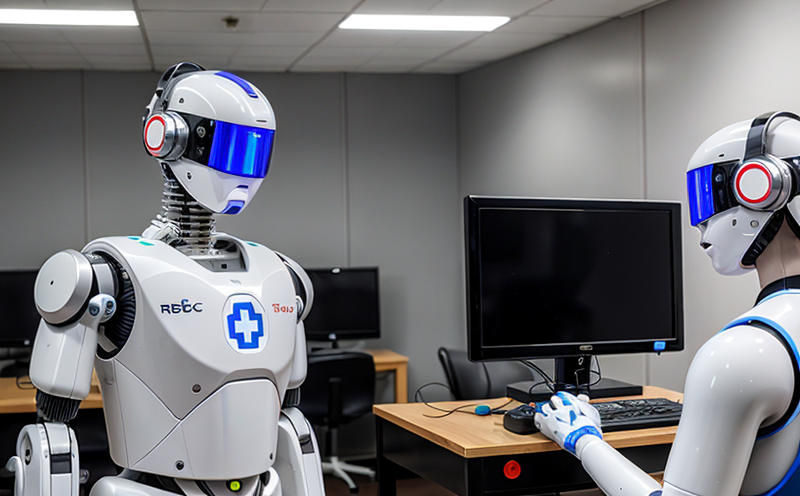IEC 62304 Software Reliability Verification for Medical Robotics
The International Electrotechnical Commission (IEC) Standard IEC 62304 is a critical document that guides the development and testing of medical devices, including robotics systems. This standard ensures that software within medical devices operates reliably under all expected conditions throughout their lifecycle.
Medical robotics involves sophisticated systems designed to interact with human patients in complex environments. These robots must perform reliably without failure, even under demanding circumstances such as emergency situations or high-stress operations. The software within these robotic systems is often the backbone of functionality, controlling every aspect from motion control to patient interaction.
The IEC 62304 standard provides a structured approach to ensure that medical devices meet strict reliability and safety requirements. It mandates systematic processes for software lifecycle management, including planning, specification, design, implementation, verification, validation, maintenance, and decommissioning. Compliance with this standard is mandatory for medical device manufacturers aiming to secure regulatory approval in many countries.
Our laboratory offers comprehensive testing services aligned with IEC 62304 standards specifically tailored for software reliability verification of medical robotics systems. We employ a team of experienced engineers who understand the unique challenges faced by developers working on this critical technology. Our state-of-the-art facilities are equipped to perform rigorous tests that simulate real-world conditions, ensuring robust and reliable performance.
Our testing process begins with thorough analysis of your software design documents using IEC 62304 guidelines. This includes verifying compliance with all relevant sections of the standard such as A.1 (Software Lifecycle Management), B.1 (Verification Methods), C.1 (Validation Methods), and D.1 (Maintenance). Once we have a clear understanding of your requirements, our engineers proceed to conduct detailed testing that covers:
- Functional Testing - Ensuring all software functions operate as intended.
- Non-functional Testing - Evaluating performance metrics like response time, throughput, and memory usage.
- Reliability Testing - Assessing the likelihood of failure under specified conditions over a defined period.
- Usability Testing - Checking that the interface is user-friendly for operators in medical environments.
We also utilize advanced simulation tools to replicate various operational scenarios, including worst-case conditions, to ensure your software can handle unexpected situations gracefully. Additionally, we provide detailed reports outlining our findings and recommendations based on IEC 62304 criteria.
By choosing our IEC 62304 compliance testing services for medical robotics systems, you are investing in the quality and safety of patient care. Our rigorous adherence to industry best practices ensures that your product meets stringent regulatory requirements while providing peace of mind regarding its reliability.
Why It Matters
The significance of IEC 62304 compliance cannot be overstated, especially in the context of medical robotics. These systems are not just tools; they play a crucial role in enhancing patient care and surgical precision. Ensuring that their software operates reliably under all conditions is paramount for several reasons:
- Patient Safety: Reliability issues can lead to malfunctions during critical procedures, posing serious risks to patients.
- Regulatory Compliance: Failure to comply with IEC 62304 standards could result in product recalls or legal action.
- Market Trust: Demonstrating adherence to global standards builds confidence among healthcare providers and consumers alike.
- Innovation: Rigorous testing helps identify potential improvements, fostering continuous advancement in medical technology.
In essence, IEC 62304 compliance is an essential step towards creating safe, effective, and reliable medical robotics systems that contribute positively to healthcare outcomes worldwide.
Environmental and Sustainability Contributions
The development and testing of medical robotics, particularly when adhering to standards like IEC 62304, has significant environmental implications. By ensuring the reliability and longevity of these systems, we contribute positively to sustainability efforts:
- Eco-friendly Operations: Reliability reduces waste by minimizing the need for frequent replacements or repairs.
- Resource Optimization: Efficient software design leads to lower energy consumption during operation.
- Extended Lifespan: Proper testing extends the useful life of medical robotics, reducing electronic waste.
Beyond these direct benefits, our services also support broader sustainability goals by enabling continuous improvement in medical technology. This not only enhances patient care but also promotes responsible use of resources and reduction in environmental impact.





